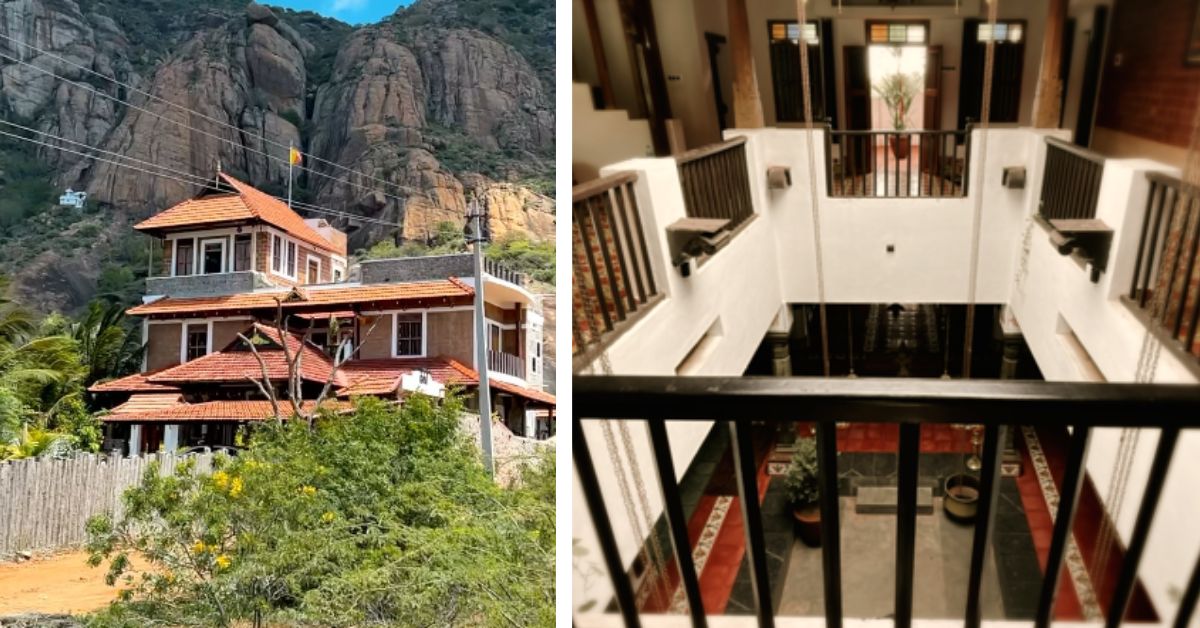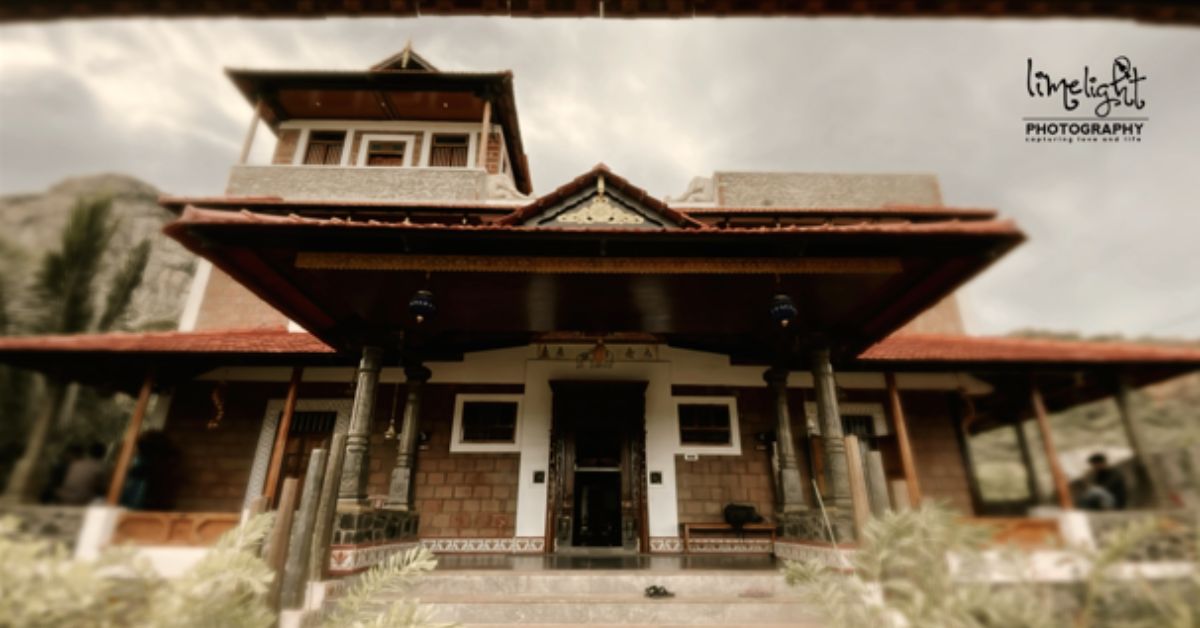Sitting amidst the beautiful hills in Pothayadi village near Kanyakumari, Tamil Nadu, is a home that was once a couple’s dream. A perfect mix of Tamil, Venad, and Chettinad cultures and styles, the place, called Muthunandhini Palace, is the love child of Rajchandar Padmanaban (35) and his wife, Naga Jeyalakshmi.
Filled with ancient artefacts and antiques from Kanyakumari, Tirunelveli, Madurai, and Karaikudi, the home stands as a testament to the rich cultures of the area. The couple decided to share their treasure of a home with others by converting it into a homestay.
“When you visit the homestay, you can expect serenity, culture, and heritage. The nature surrounding us will fill you with a sense of peace, and our authentic meals will nourish your soul,” says Rajchandar in a conversation with The Better India.
The homestay is not just a marvel of culture but also a great example of sustainability. From composting their waste to implementing measures to recharge groundwater, the mud homestay is raising the bar for nature-friendly travel.
Inspiration from grandmother’s home
Born and raised in Kanyakumari, Rajchandar is a geo-data scientist who has spent the majority of his life around environmentalists.
“Spending so much time around them, I wanted to make my home as aligned with nature as possible. I had always been concerned about the degradation of our environment and didn’t want to contribute to it,” he shares.
Rajchandar fondly recalls his grandmother’s home, surrounded by greenery.

“Visits to her home were my favourite part. At that time, I was unaware of how her deeply traditional and nature-friendly home would one day become an inspiration for my dream home too,” he says.
“Her home was very simple with minimal use of cement and very traditional in design,” he says.
While living in the city, he longed for a more secluded place surrounded by nature.
“When I first saw the village and the piece of land which now holds my home, it was like love at first sight. I could envision the future of the place and hence chose to buy the land,” he says.
Rajchandar continues, “There is a very interesting story that goes around about the hills surrounding the area. It is said that when Lord Hanuman lifted the Dronagiri Parvat to take it to Lord Lakshman, a piece of it broke off and fell here. Hence, these hills have a lot of medicinal plants growing around.”
The couple did not want to disturb the biodiversity of the area and decided to build a home that blends into nature instead.
In 2021, they started to work on their dream home and opened their doors to the guests in 2022. “Since we decided to share our space with guests, we have hosted more than 200 guests so far,” he informs.
Made with some mud and lots of love!
The homestay is a mix of different architectures, combining a blend of Tamil, Venad, and Chettinad styles that showcase the rich cultural heritage of Tamil Nadu.
“I am personally a collector and love collecting artefacts from the area. I had been collecting a lot of art pieces and decided to display them in the home. Some of these pieces are more than 100 years old,” he says.
One thing that Rajchandar was clear about from the beginning is that he wanted to use natural materials to build the home.
“We did not just want to have sustainable practices. We wanted to make the very roots of our home eco-friendly. We used eco-bricks made of limestone and red clay for the walls,” he says.
Listing all the natural materials that he used, Rajchandar says, “Besides eco-bricks, we also used Athangudi Tiles. These tiles are made up of sand found near Athangudi River which is much more sustainable than normal tiles.”
For the ceiling, the scientist used a technique called filler slab technique to minimise the use of concrete. According to Studio DCode, “Filler slab is an alternate slab construction technology where part of concrete in the bottom of the slab is replaced by filler material.” The roofs also have clay tiles on the roofs too.
“We used red soil, lime, cow dung, rice dusk, egg and jaggery to make a paste for construction,” he shares.
Additionally, the homestay features rainwater harvesting, and they are in the process of installing solar panels to harness the sun.
“We also make compost out of our kitchen waste, which is then used in our garden. We grow all our plants and food organically so our guests can enjoy fresh food daily.”
The place boasts 5 bedrooms, 3 balconies, and 3 living spaces for guests to enjoy. “While the homestay is shared by us with the guests, we also prioritise their privacy.”
Rajchandar highlights, “A unique feature of the property is its natural coolness regardless of the weather outside. With 50 upcycled windows that are over 100 years old, plenty of air circulates inside. Additionally, since the house is made of mud and clay, it remains naturally cool throughout the year.”

One common feedback he receives from guests is how his home feels like their own.
One of the customers, Gavin, who stayed at the property, says, “The place really feels like home. Living at their place with all the exquisite architecture depicting our Tamil culture was an experience of a lifetime. It is huge in size with several areas to relax but the uniqueness was in the small details like the way they treated us. The food, their accommodating behaviour made our stay very enjoyable.”
Discussing future plans, Rajchandar says, “We really want to expand the property as many people want to stay, but we are often fully booked. We also aim to incorporate more sustainable measures like solar energy into the current homestay.”
You can book your stay at this Rajchandar’s homestay by reaching them at 9360946642
(Edited by Padmashree Pande; All Pictures Credit: Rajchandar)
No comments:
Post a Comment